Dr. Ajit Mahapatra, food safety scientist at Fort Valley State University, aims to help peanut farmers increase their yield and product quality. The title of his project is “Use of Sensor-linked Management Techniques and Systems for Water Use Efficiency, Predicting Harvest Maturity, Enhancing Yield and Quality of Peanuts and Economic Appraisal – a Multidisciplinary Approach.” The associate professor explained the potential impact of this $90,000 study, which the National Peanut Board, Georgia Peanut Commission and Georgia Agricultural Commodity Commission for Peanuts funded for 2020-2023.

- What is the purpose of this research?
The parameters include soil moisture, air humidity, soil and air temperature, solar radiation, wind speed influence and fungal diseases in peanuts, hence, affecting the quality of the crop. With the emergence of sensors and electronic technologies, it is possible to use sensor technology in peanut production and the management process to enhance water use efficiency, average yield and product quality.
- How will this research make a positive difference in people's lives? Why does it matter?
This is an interdisciplinary project engaging two universities (FVSU and Purdue) and a federal laboratory (U.S. Department of Agriculture’s [USDA] Agricultural Research Service [ARS]), where faculty and researchers with complementary expertise are working together to solve a real-world problem that our peanut growers face. We target how we can bring technology and science-based solutions to peanut growers’ fields, hence, increasing the quality and yield of the crop. We believe this would contribute to the socio-economic benefits of the growers.
Information on water management techniques, sensor capability and guidance to use the sensor systems developed by this project will be disseminated to peanut growers, which will help them in their decision-making process to enhance the yield and quality of peanuts. The cost-benefit analysis will help them make rational decisions related to their farming businesses in Georgia and elsewhere.
- What work has already been done to conduct this research?
Three varieties of peanuts (Georgia-06G, Georgia-09B and Tifguard) were planted in 12 experimental plots (3 acres) on FVSU’s new farm. Soil health and fertility scores were determined for the plots. The size of individual plots was 30.0 by 7.3 meters, consisting of eight rows. Plant spacing between two rows was 0.9 meters. Distance from the middle line of two rows to the middle line of the adjacent two rows was 1.8 meters. Some of the phenotypic traits related to the assessment of disease and physiological parameters were recorded.
A portable integrated prototype sensing system was designed and developed. It can measure and display temperature and relative humidity of air, moisture content and temperature of soil. It is battery-operated and can be charged using a standard phone charging system. The measured parameters can be stored on an SD card. Emphasis has been given to making these systems modular, portable, cost-effective and easy to use.
The following are collaborators:
· S. Panigrahi, professor of electrical and computer engineering technology at Purdue University, developed the sensing systems in his Integrated Sensing and Smart Solutions Lab.
· S.M. Punnuri, assistant professor of plant molecular breeding at FVSU, will assess phenotypic traits related to disease and physiological parameters.
· X. Liu, associate professor of agricultural economics at FVSU, will conduct a cost-benefit analysis.
· J. Surrency, associate professor of plant and environmental soil science at FVSU, assessed soil parameters.
· B. Guo, research plant pathologist at USDA-ARS in Tifton, will assess pre-harvest aflatoxin contamination.
· A. Ayele, postdoctoral research associate, and H.L. Degala, research assistant, both at FVSU, will assist in designing and conducting field and lab experiments, including collecting and analyzing data.

- What significant results have you seen so far?
We conducted field studies on FVSU’s new farm. A sensing module was used to measure soil moisture, air humidity, and soil and air temperature. This is the first year of the project, and it will take multi-year research and development to obtain expected results.
- What are your next steps?
An advanced version of the sensing module is currently in the process of development and will be deployed in FVSU field plots to assess and optimize water usage and mitigate fungal incidences. A mathematical model will be developed relating the soil moisture, temperature and water use data with peanut yield and quality. Another key aspect of this project is to develop and adapt the technology in a form that is easy to use, cost-effective and accurate. As a result, our growers can use this platform to make the right decisions at the right time.
The cost-benefit analysis will be conducted based on the cost of various equipment and deploying equipment, benefits from efficient use of water, increased peanut yields, enhanced peanut quality and premium marketing prices for high-quality peanuts. This will help peanut farmers make rational decisions on various operations related to their farming businesses.

